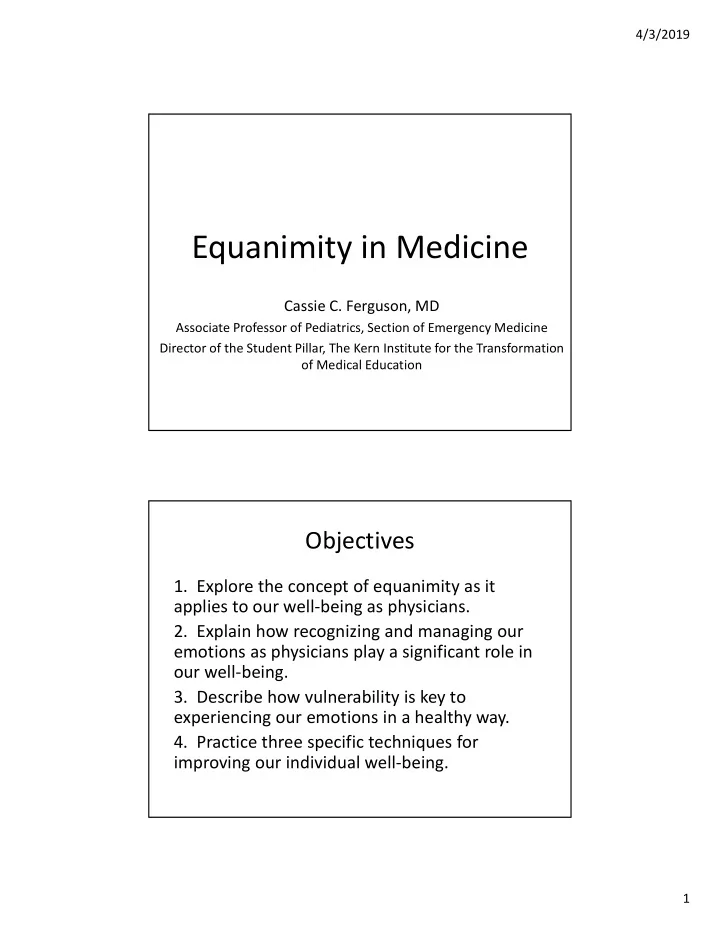

4/3/2019 Equanimity in Medicine Cassie C. Ferguson, MD Associate Professor of Pediatrics, Section of Emergency Medicine Director of the Student Pillar, The Kern Institute for the Transformation of Medical Education Objectives 1. Explore the concept of equanimity as it applies to our well-being as physicians. 2. Explain how recognizing and managing our emotions as physicians play a significant role in our well-being. 3. Describe how vulnerability is key to experiencing our emotions in a healthy way. 4. Practice three specific techniques for improving our individual well-being. 1
4/3/2019 Disclosures • I have no relevant financial relationships with commercial interests to disclose “One of the great mysteries of illness is that no one can be healed by anyone whose emptiness is greater than their own.” Mark Nepo 2
4/3/2019 3
4/3/2019 August 2009 4
4/3/2019 “We were taught,” he said, “that only the patients’ emotions should matter.” 5
4/3/2019 “Physicians are prone to all the same human emotions of pride and guilt and shame that distort our reason, but we are just trained to believe that we can surmount them.” In Shock, Awdish Aequanimitas 6
4/3/2019 Is there a better way? 7
4/3/2019 Physician Responses to Grief – Altered treatment decisions – Mental distraction – Emotional and physician withdrawal from patients – Burnout Granek, et al. Arch Intern Med (2012) % reporting burnout: 2011: 45.5% 2015: 54.4% % OB-GYN physicians reporting burnout: 2011: 48% 2015: 53% Shanafelt T, et al. Mayo Clin Proc (2015) 8
4/3/2019 48.4% 28.4% Shanafelt T, et al. Mayo Clin Proc (2015) Burnout… …is specific to the workplace and is typically caused by system bureaucracy or dysfunction that interferes with what you know you could do to help and to heal …is the result of the accumulated impact of thousands of everyday “micro” traumas 9
4/3/2019 10
4/3/2019 We were called to this work. 11
4/3/2019 “Nothing ever goes away until it has taught us what we need to know…it just keeps returning with new names, forms, manifestations until we learn whatever it has to teach us about…how we are closing down instead of allowing ourselves to experience fully whatever we encounter, without hesitating or retreating into ourselves.” Pema Chodron “Vulnerability… …is not winning or losing; it’s having the courage to show up and be seen when we have no control over the outcome.” Brene Brown 12
4/3/2019 Have I missed an important diagnosis? Is surgery the right option for this patient? For this family? Do the benefits of this medication outweigh the risks? Is it safe to send this patient home? Did I save this patient for a good life? 13
4/3/2019 “We often cause pain rather than feeling it.” B. Brown 14
4/3/2019 Recognize Acknowledge Investigate Natural awareness Pay attention to what you’re saying to yourself and take some responsibility for that voice. Jill Bolte Taylor 15
4/3/2019 A shift from the belief that we can control what we feel to the understanding that the only thing we can control is how we respond Where are my feet? 16
4/3/2019 “…is not to try and throw ourselves away and become something better. It’s about befriending who we are already.” Pema Chodron “Mindfulness means paying attention in a particular way: On purpose In the present moment Non-judgmentally Jon Kabat-Zinn 17
4/3/2019 Self-compassion is the seed of well-being and the basis of compassion for all others 3 Elements of Self-Compassion 1. Self-kindness vs self-judgement 2. Common humanity vs isolation 3. Mindfulness vs over-identification www.self-compassion.org 18
4/3/2019 one for me & one for you “The secret of transformation is in how we handle this very moment.” Thich Nhat Hanh 19
4/3/2019 It is the strong back that supports the soft front of compassion Roshi Joan Halifax Thank you. Cassie Ferguson, MD cferguson@mcw.edu Twitter: @mcwquips 20
Recommend
More recommend